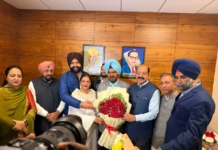If we destroy biodiversity, we destroy the system that supports human life: Alok Shekhar
Kanwar Inder Singh/ royalpatiala.in/ Chandigarh
Human actions, including deforestation, encroachment on wildlife habitats, intensified agriculture, and acceleration of climate change, have pushed nature beyond its limit. If we continue on this path, biodiversity loss will have severe implications for humanity, including the collapse of food and health systems. The emergence of COVID-19 has underscored the fact that, when we destroy biodiversity, we destroy the system that supports human life. Nature is sending us a message which we need to decode and take collective action. This was expressed by Principal Secretary Science& Technology and Environment Punjab, Alok Shekhar at the occasion of World Environment Day Celebration webinar. The webinar was Jointly organized by Pushpa Gujral Science City and Punjab Pollution control Board. Around 100 students from all over Punjab participated. Hosting the Webinar Director General Science City Dr. Neelima Jearth said that human beings were consuming natural resources beyond the carrying capacity of the Earth. This calls for urgent action to address the global environmental threats. World Environment Day is a reminder for action.
Speaking about the impact of COVID-19 on Environment & Bio-Resources, the Chairman PPCB Dr. Satwinder Singh Marwaha said that theme of this year’s World Environment Day is “Bio-diversity” and the slogan is “ Time for Nature”. Further he said that it has become more important to Nurture the Environment at this time when the entire world is fighting the pandemic COVID-19. Nature provide us Food to Eat, Air to Breathe and Water to drink which represents the environment one way or the other. Dr. Marwaha also stressed the need to improve quality of river water as industries were not only the source of water pollution but also the domestic waste was a significant polluter. Closing of industries and ban on transports due to corona virus had a greater positive impact on air pollution than on water pollution.
He also urged the participants to sensitise the people especially the farming community not to burn stubble/crop residue, which not only damage the soil texture by affecting its fertility besides polluting the environment as well as causing harms to human health.
At this occasion J. JUSTIN MOHAN, Secretary National Biodiversity Authority, Govt Of India, informed that every country had a sovereign right on its biological resources. He talked about the provisions in the Biological Diversity Act and the lack of awareness among industries, public and traders about the concept of Access and Benefit sharing which can be a big incentive for conservation and sustainable use. He emphasized that Government needs to strengthen and empower the Biodiversity governance structure in the country to overcome these challenges. Dr. Chandrika Bahadur , Director, SDG Academy, which is associated with the Earth Institute, New York, spoke on the 17 Sustainable Development Goals. She suggested that Biodiversity, which cuts across several SDGs, could be a key Strategy for achieving SDGs and shared global experiences in the area.
PGSC also organised Poetry and Declamation competitions at the occassion which received an overwhelming response from students and general public.
June,5,2020

















